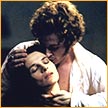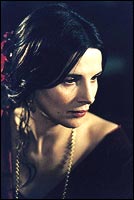
|
An affair to remember
Children of the Century explores different facets of love.
|
Nuggehalli Nigam
For the cynics amongst us, love is a mirage and only serves to disguise the harsh realities of relationships in the meaningless jargon of affection. Children Of The Century, a beautiful period drama, challenges this outlook as it follows the passionate and often tumultuous path of two great French litt้rateurs of the nineteenth century.
In 1832, Alfred de Musset (Benolt Magimel,) a 23-year-old playwright and poet, is throwing his youthful exuberance into thoughts of despair. The Napoleonic years have left him bereft of any hope of the salvation of mankind.
"We had no expectations, barely the will to survive," he says. "I, myself, had realized that death was the only mistress worth courting, but she never once looked my way." His statements suggest a melancholy spirit verging on manic depression, a character flaw that would wreck havoc on his relationships.
At a public reading in Paris, Alfred meets George Sand (Juliette Binoche), another writer of repute, or ill-repute -- depending on if you liked or disliked her provocative writing. Clad in a black dress with her head covered, she presents an austere figure reading her latest writing on female frigidity in a marriage. It is a subject not taken lightly in Paris, and she outrages her critics and in turn is ridiculed by them. Her only defendant is Alfred, and they strike a friendship based on their common passion for books.
When the writers fall in love, their passion has its own unique flavor. Alfred knocks on Sand's door late in the night, having finished her book, and mesmerised by it. It's an act of love but something more than that -- a passion for high literature and the joy one finds in sharing literary appreciation with others. Later, Sand is in tears when Alfred meets her; she has read his play and is overwhelmed by it. The moment is tinged with the cathartic experience of appreciating artistic works, mingled with the added oomph provided by romance.
Alfred's mother is not happy with the relationship, but Alfred is headstrong, and leaves for Italy with Sand. The trip does not do any good to the relationship. Sand is constantly ill, and Alfred has no inclination to nurse her back to health. At 23, love is a still an ideal state of bliss for Alfred, and the realities of an intimate relationship leave him restless and bored. Instead of dealing with Sand's indisposition with maturity, as perhaps an older person might have done, Alfred turns to whores and opium.
Their estrangement continues to simmer in Venice where the couple spend a considerable amount of time. Finally the fault-lines in the relationship cannot be ignored anymore. The night that Alfred admits to Sand that he does not love her anymore, he succumbs to fever brought about by an excess of opium.
A local physician, Dr Pagello (Stefano Dionisi) and Sand together bring him back from the brink of death but in the process, fall in love. When Alfred learns of this, he nearly kills Sand, but finally accepts their love. This is one of several episodes in the movie that tests and ultimately overwhelms the relationship between Alfred and Sand, but never overwhelms their love for each other. To understand the difference is to understand this film.
Period costume dramas are a risky affair. They can be gaudy, frumpy and cheap; or they can be elegant, evocative and rich with unarticulated emotions. Children of the Century falls in the elegant category and adds to its excellence in couture, a fitting ambience for the period as well. The Paris in which Sand and Alfred first meet teems with people in colorful pageantry, and there is also a sense of excitement (contrary to Alfred's glum ruminations) connected with the post-war period of literary and artistic innovation.
The period in which Alfred and Sand lived produced artists of the likes of Delacroix, Berlioz, Dumas, Hugo and Chopin. Children of the Century captures eloquently the confidence and jauntiness of Alfred and Sand, for they were not merely participating but also creating the literary world of their time, and they were acutely aware of it. 
As with the emotional undercurrents of the period, Children of the Century also makes real the sheer beauty of nineteenth century Venice. The candle-lit streets of Venice look even more beautiful with their reflections in the adjoining canals; and the raucous conversations of tourists and laborers in the background add a touch of excitement and urgency to the atmosphere.
Juliette Binoche (The English Patient, Chocolat) and Benoit Magimel (The Piano Teacher) share some undeniable chemistry in the film. It is reflected in their real life as well. They are the parents of two children. It is a vindication of Magimel's talent that he comes across as a better actor along side the formidable Binoche. He imbibes his role with appropriate proportions of cockiness and vulnerability. He portrays a character capable of extreme cruelty to his loved ones' feelings, and sometimes to their physiques as well (in one scene, angry with his brother, he stabs him with a fork.) Yet, he is capable of great love and unbridled passion, a gift that, at least in Sand's eyes, redeems him of his other faults.
The theme in Children of the Century is that love is not easy. The film explores facets of love that only the French seem capable of; about how love is capable of enveloping its partakers in a make-believe world, how it clashes with ordinary day to day responsibilities and worries, how it matures over time and how love can destroy relationships because of its capacity to arouse egotism and jealousy. Alfred and Sand were among the foremost romanticists of their century, and they discovered that love is not an emotion cooked up by the writers of their genre to burnish their poems and plays; it is a real tangible thing that brings much joy, and many times, much bereavement as well.
Tell us what you think of this review